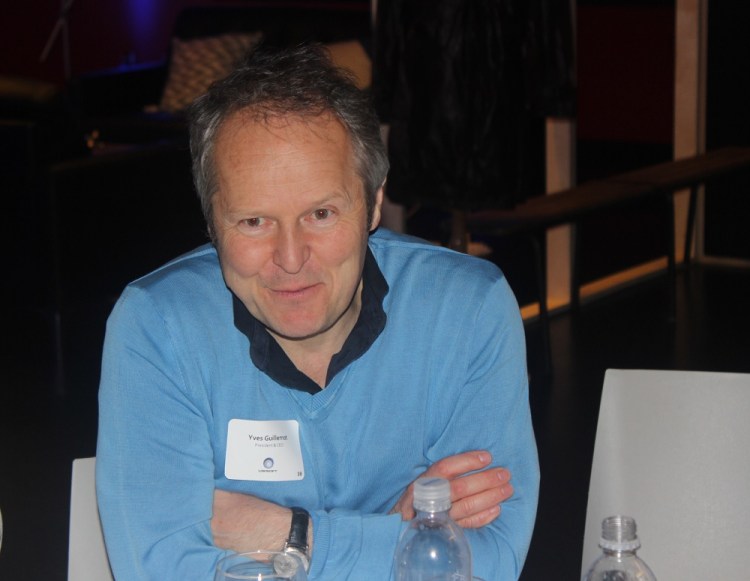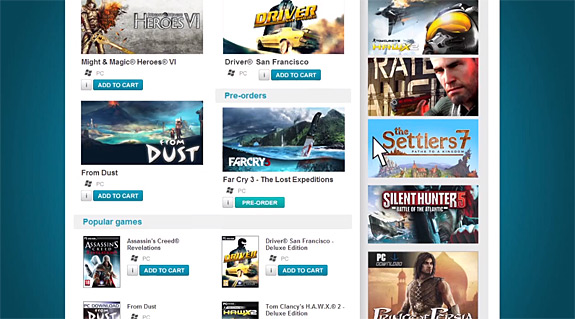Guillemot: It’s not really Uplay that was the trouble. It’s the launcher itself. It’s called Uplay, so it was affected by that. The service was not expecting that many people playing at the same time. It took us a few hours to deal with that. It’s something we have to look at, because now we have lots of pre-orders, and lots of people downloading and buying at the earliest moment. It makes the number of people playing jump very quickly to a very high level.
GamesBeat: Do you think it’s harder to project that kind of thing today, now that people don’t have to preorder a physical copy? They can just buy a download as soon as it’s available.
Guillemot: We have more and more predownloads. Microsoft did one and so on. At the second we opened the game, we had this flow of people coming in. I’m not sure it’s exactly that, but the fact is, we went to 530,000 people playing at the same time.
GamesBeat: A lot of people still associate Uplay with DRM and piracy issues, but now it’s more of a feature used to give players more content, more stuff. But you guys are quite modest about that. Why don’t you communicate more about what Uplay is? A lot of my friends who play a lot of games, they don’t know that you get added content when you sign in for something like Child of Light.
Guillemot: It’s true. There are two issues. I think we don’t give enough yet. We need to make sure our studios are giving more content, more advantages when you’re a Uplay member. It’s just that up until now—We’ve given quite a lot, but not to now. We’ll include that and we’ll market it more.
What we’ve done with the Uplay lounge, before the show, we asked people to come up with creative ideas. There was a competition between the fans. A certain number of them were selected, and we paid everything for them to come to E3. They’re going to the conference. They’re also going to the booth to see all the games. They have a special place where they can ask questions of all our game creators. I’ll be meeting with them. We’re trying to talk with them as much as we can, so we can understand what they like, what we should do better, and so on. That’s a way for us to get closer to our customers.
GamesBeat: How many people are you bringing here through that program?
Guillemot: The winners of the contest, there are 12 of them, those 12 ambassadors that we’re flying out. But we also have an open invitation to Uplay members attending the show to come over and talk.
GamesBeat: What do you think the importance of Uplay is, not just in getting people to play your games, but building a community around them?
Guillemot: It’s major for us. We need gamers to help us improve our games from the beginning. On The Division, for example, we had the fastest community building—I think it’s the biggest community at the moment on a new IP. We’re already communicating a lot with those fans – asking them what they want, showing them things, seeing their reactions. We also give them tools to express themselves on blogs and things.
When we build a community, we want them to be close to the team that’s creating the game, so that we’re going in the same direction. The community fits with what the team wants to create in the long term.
GamesBeat: Are you worried about leaks?
Guillemot: Maybe a bit less. That generally happens after we’ve announced a certain number of elements. But we give them more than we used to in the past.
GamesBeat: What’s your business like as far as merchandise and licensing?
Guillemot: It’s growing. It’s still small, but it’s growing year after year. We’re getting ready for that, because we have the movies coming. On Rabbids, for example, we were able to have special booths at Wal-Mart, Toys R Us, Target. We’ve started to sell quite a lot of that kind of thing.
A TV show like Rabbids is the best vehicle for selling things like this, but we’ve also done well with Assassin’s Creed. We have the double blade and a certain number of other elements that we’ve started to be able to merchandise and sell. They do quite well. We’ve reached 100,000 units on some items like that. It’s getting more interesting.
GamesBeat: What do you think your biggest franchise is today?
Guillemot: That’s a good question. Assassin’s Creed is generating the most revenue. The two we feel might bring us more customers are Watch Dogs and The Division. It’s an RPG on one side and an open world on the other. A modern open world increases the number of people who might be potentially interested.
You’ll see Just Dance tomorrow. We’re opening the brand up to a bigger audience, because you’ll be able to play with a mobile device in your hand. It becomes your Wiimote, in fact. It’s quite interesting, what we can do. It can link to any set-top box or any smart TV, any PC, any machine you have at home.
GamesBeat: Every E3, it seems like you have one crazy idea, whether it’s laser tag or some other thing. Is there something like that you’ll be talking about this year?
Guillemot: This year, Just Dance Now – that’s the name of the game – is what we really expect will surprise people. We’re teaming up with Coca-Cola for that one. Coca-Cola is going to invest a lot in the project. They’re going to market Just Dance. They want to be in the video for it. You’ll see ads at many events they want to create. It’s a big deal between our two companies.
GamesBeat: I was wondering if next-gen development is turning out to be harder than you thought. We’ve seen delays on Watch Dogs and The Division. Is next-gen a factor?
Guillemot: It’s harder, because there are so many things to do, so many possibilities. We saw that when we launched Watch Dogs. To make sure the mobile works with the seamless multiplayer, with all the things we’re bringing, it’s more complex. It’s always on. There are lots of things to check and control. We didn’t do a beta on Watch Dogs, for example, and so it took us a certain amount of time to make everything work.
We’re also at the very beginning. Starting next year, things should go smoother. We’re not expecting every game to take longer to make. It’s not as complex, I would say, as the jump to PS3. PS3 was extremely difficult to develop on when it came. All our teams had been on Xbox, and they had to learn how to develop for PS3, which was quite difficult at the time.
GamesBeat: With all that complexity comes a great deal more potential as well. Do you think the answer is increasing staff headcounts, more bodies on the ground, or is it learning how to exploit the technology over time?
Guillemot: The first thing is making sure we re-use more effort. Today, we create a car at one studio, and we don’t ever re-use that car in any other game. We need to make sure we can re-use more items that people won’t care about. That’s one direction we can take, to make sure we optimize our investment.
Another thing, what I want to do more and more is work the way they do in the movie industry, having a more detailed budget before greenlighting a game. We need to make choices early on about where we’re putting our money. What’s the most interesting thing for our gamers? That, I think, will improve the efficiency of development.
GamesBeat: In the movie industry they often finish a film months before it’s released, whereas in games you typically work right up to the five weeks before a game comes out.
Guillemot: Not even five weeks sometimes.
GamesBeat: Is that where you want to get to with games?



